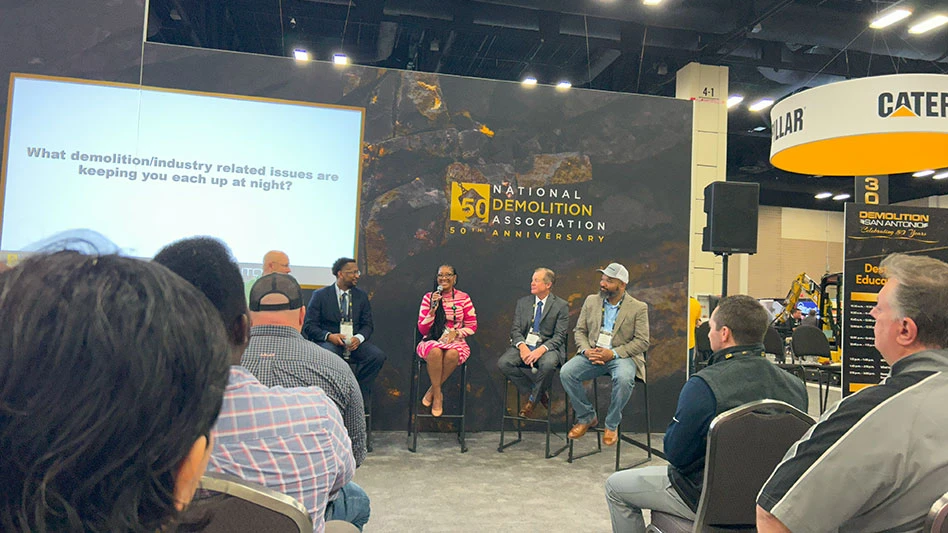
Photo by Haley Rischar
Safety and workforce were top of mind at this year’s National Demolition Association’s (NDA’s) annual convention in San Antonio.
The convention’s educational sessions emphasized the importance of well-established safety protocols and their role in attracting new, often younger, laborers.
The session “What keeps you up at night?” moderated by Richard Adamo, president of Adamo Group, underscored some of these topics.
For Kerry Nazario, vice president of operations and a corporate health and safety officer for Target Contractors LLC, the preparedness of crews for any situation is paramount.
“[Demolition] is an art form. We’re always changing the scenery, changing [the] landscape,” he said. “But as it changes, how we prepare our employees to recognize those changes, do a risk assessment and then apply the proper mitigation—that’s what keeps me up at night. Did I prepare my team well enough to identify that and know what to do?”
Regarding day-to-day operations, the timing of a project was a concern mentioned by Michael Rutt, superintendent at Remedial Construction Services.
“I lay in bed tearing the facility down over and over in my head trying to make sure that we don’t rush the big equipment and [that] we take the time to clean, get the wires pulled, make sure it’s ready for the demolition to begin,” he said.
A common goal
To handle the complex projects demo firms often are tasked with, Brian McKinney, founder and CEO of Gayanga Co., said embracing technology can help automate tasks and increase safety.
“We’re using AI [artificial intelligence] in our business intelligence to automate processes; it’s very new to us,” he said. “We [were] sitting there looking at how … to do a writeup of a blueprint of what some tasks are.
“For example, the one [project] had this very detailed process we have to do with … documentation. … I [was] like, ‘How can we do this more efficiently, so someone doesn’t miss something?’”
He added that collaboration between firms and shared perspectives can help establish best practices.
“We’ve got to be willing to share our solutions because I try to operate from an abundance mentality. …. I want to add value to every room. So, I think that sharing information and our lessons learned and [being] willing to do more with safety, right?”
This transparency can extend to working with owners, too, said LaJuan Counts, director of the construction and demolition department for the city of Detroit.
She explained that honesty during the proposal process, as well as throughout a project, is appreciated.
“I think it’s very important that, as contractors relaying that information to the owner, you’ve got to be honest. … If I feel like I’m being told the truth from the very beginning, I can deal with the truth,” she said. “I feel like we [as an] industry need to be very honest when you’re having those discussions with … owners so they know upfront exactly what those timelines look like.”
Attracting the next generation
A major talking point of the session was maintaining skilled labor, a topic that McKinney said is his biggest concern concerning the industry.
“We are an industry where we have some amazing, talented professionals across the spectrum. … As they get older, we don’t see as many young people wanting to fill those rooms,” he said. “How do we engage the next generation to teach them not only to take pride in the value of our industry but economic opportunities?”
Drew Lammers, vice president of outside operations at Cohen USA, said prioritizing quality of life has been an initiative his company has shifted toward.
“When I [came into] the demolition business, you were working 50 to 60 hours a week; the younger generation does not want to do that. Money is not their big pressing issue, so we flex [hours].”
Exposure to a wider range of people can help create opportunities, as well.
“A lot of young Black women in our community don’t see this as an opportunity for them,” Counts said. “So, I make it a point to be out in the community. I’m at career days, I’m in recreation centers, I’m making sure that our neighborhoods, our community, our culture understands [this] is an option.”
McKinney mentioned similar efforts to engage communities, noting that it’s important to resonate with the audience being targeted.
“Figure out where—if you’re in a culture where hunting is big or boating—how does your workforce … experience that with the economic opportunities that you provide,” he said. “I take pride in watching the upward social mobility that people are working [toward].”
Latest from Construction & Demolition Recycling
- US Senate backs reduced cuts to EPA
- US EPA offers brownfields-related funding
- Sky Quarry seeks crowdfunding support
- Caterpillar releases the new Cat 980 GC Wheel Loader
- NAPA leaders participate in USDOT roundtable
- Yanmar CE launches full line of compact equipment
- Metso reports increased orders after flat H1
- Block Island Recycling Management Inc. aims to promote environmental stewardship





